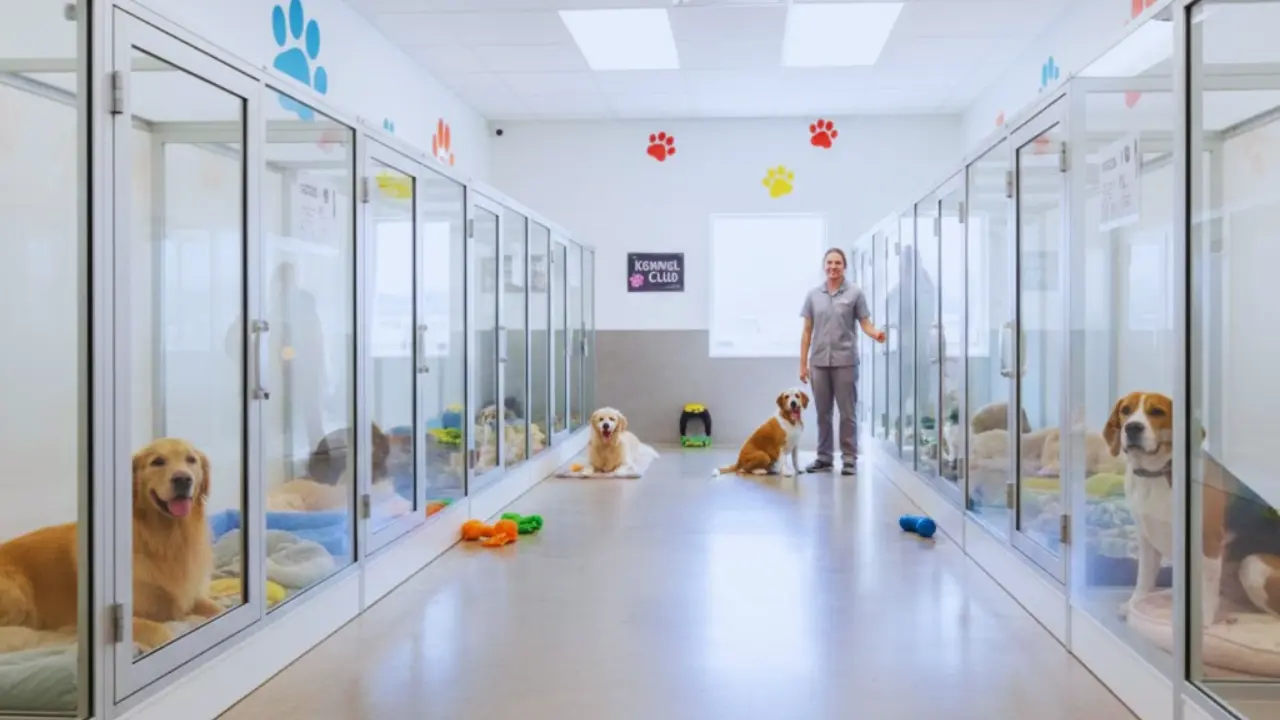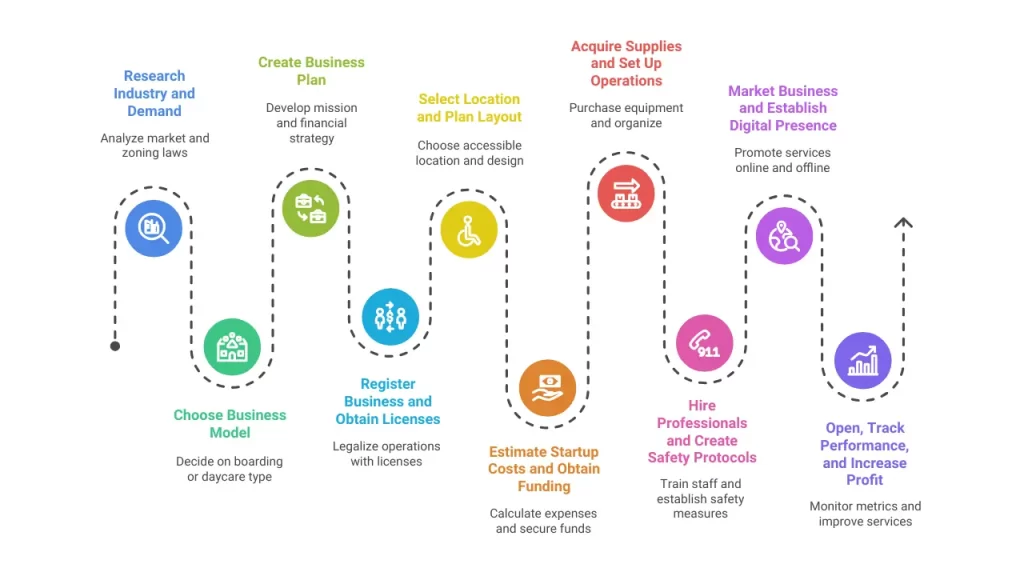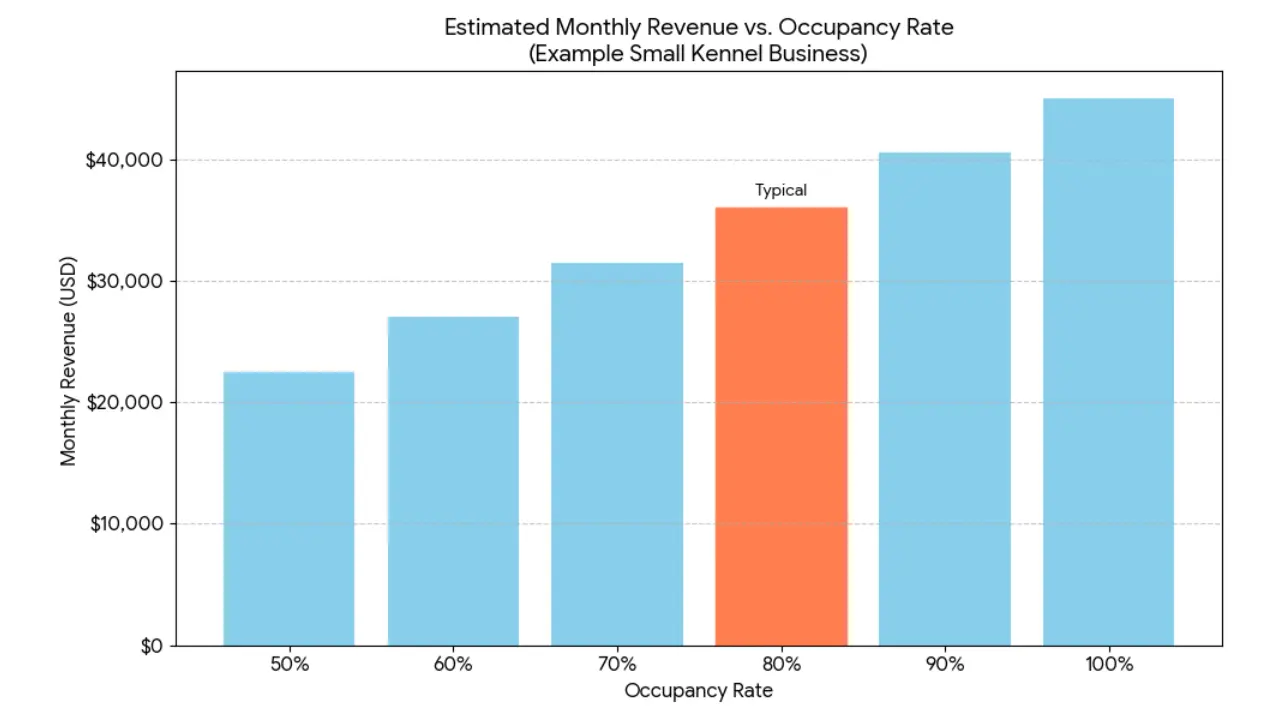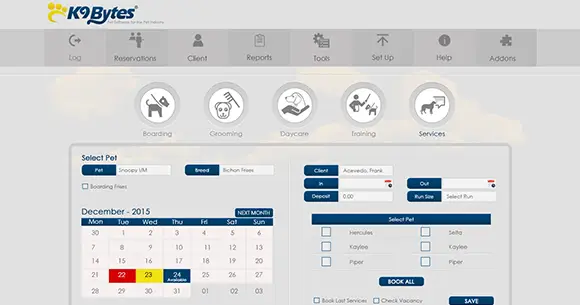Quick Summary: Starting a profitable dog kennel business requires a solid plan, including thorough market research, securing substantial funding (startup costs range from $75,000 to over $250,000), and obtaining all necessary licenses. Profitability is high, with revenue depending on occupancy and additional services like grooming. However, success also depends on managing high staff costs and leveraging modern kennel software for efficient operations, with most businesses reaching profitability within one to two years. But what is the single most significant expense you must control to turn that impressive revenue into real profit, and what specific technology is essential for streamlining your daily operations and ensuring pet safety? Read the full article to discover the important steps and tools for turning your pet passion into a thriving business.

Are you a dog lover considering a dog business? Excellent! The dog kennel business is booming in the U.S. because dogs are family, and we need quality care when we travel or work. You could be an entrepreneur at heart, a groomer who wants to expand services, or a pet lover looking to make money in a fantastic market.
Starting your own dog business can feel overwhelming, but there is no need to panic. We will walk you through the process of starting a kennel business. We will help you create your dog kennel business plan, show you how much money to set aside for startup costs, guide you through the paperwork, and provide steps to real profitability.
By the end of this article, you will be perfectly equipped to start and operate a profitable dog kennel business.
What is a Kennel Business?

A dog kennel business is a specialized facility for pets to receive professional care and housing by a trained professional while their owners are unavailable. Traditionally, a “kennel” is meant to be a place for an overnight stay, but the business now describes a few key models that include:
Dog Boarding:
This involves overnight care or a “home away from home” experience, often in private suites with climate control and various amenities.
Dog Day Care:
These facilities supervise and care for dogs in organized play groups (daycare) during the day for busy dog owners.
Mixed Models:
The most common and profitable facilities offer boarding, daycare, and additional services such as grooming and dog training.
The demand for high-quality boarding is growing fast in the U.S. because modern owners view their pets as family members. They want more than just a cage; they seek personalized, safe care and enrichment. This high demand is fueling a pet care market valued at over $8.4 billion, proving that people are willing to pay for peace of mind. Let’s start exploring how to start a dog kennel business.
How to Start a Kennel Business – A Step-by-Step Blueprint

Step 1 – Research the Dog Kennel Industry and Local Demand
Your first move is to look closely at your area. Study the market size to see if enough people need your services. Check out your competitors, their charges, and the special services they offer. Most importantly, research local zoning rules. These laws will tell you where to legally run a dog boarding or daycare business.
Step 2 – Choose Your Kennel Business Model
Decide what kind of care you want to provide. Is it boarding-only? Is it a daycare model? Or is it a luxury boarding model that offers premium services for higher prices but costs more to set up?
Step 3 – Create a Detailed Dog Kennel Business Plan
A solid business plan is your map to success. Write down your mission, like being the safest, most fun place for dogs. When starting a kennel business, define your target customers (busy travelers, senior dog owners). Include your pricing strategy and projected revenue, or how much money you expect to make each month.
Step 4 – Register Your Business and Obtain Licenses
To operate legally in the U.S., you must register your business and obtain a general and specialized animal boarding license. Research how to start a dog kennel business in your chosen location. Then, get Pet business insurance (liability and property) to shield yourself. Health permits will be required for sanitation requirements.
Step 5 – Choosing the Location and Planning the Layout of the Kennel
Location selection is critical in your kennel business plan. You must ensure clients can access your location easily and research the zoning requirements. When designing the kennel layout, ensure it has good ventilation, safe flooring that can be cleaned, and reliable fencing. Additionally, you will need to provide separation for different dog sizes.
Step 6 – Estimate for Startup Costs and Obtain Funding
Be sure to identify the main costs of starting a dog kennel business: land or leasing costs; construction or renovation costs for the facility, cage, or kenneling; and miscellaneous operating costs for supplies. This stage also ensures that you have an idea of your investment and facilitates small business funding (for example, a loan or savings) to cover those costs.
Below is a complete section explaining the cost of starting a dog kennel business in detail:
Step 7 – Acquire Kennel Supplies and Set Up Operations
Purchase necessary supplies and equipment for daily operations. It includes high-quality cleaning products, feeding supplies, comfortable bedding, and reasonable climate control (heating/air conditioning). You will also need play equipment and toys to enrich your dog guests.
Step 8 – Hire Professionals and Create Safety Protocols
Your staff will be your most valuable asset. Hire trustworthy staff trained in pet first aid and CPR. Maintain a proper staff-to-dog ratio for safety. Train your kennel staff to accurately interpret dog body language, preventing fights and effectively managing stress.
Step 9 – Market your Kennel Business and Establish Digital Presence
Start marketing early! Develop an image of professional branding. Create social media pages and set up a website domain. Claim your Google Business Profile and encourage reviews from the start to build trust.
This is just the beginning of your journey, so for a deeper dive into crafting a full strategy, be sure to explore our complete guide on Pet Business Marketing.
Step 10 – Open, Track Business Performance, and Concentrate on Increasing Profit
Start with a soft opening and then hold your grand opening! Continuously monitor key metrics, such as occupancy rate and returning customer numbers. Solicit customer feedback, and always strive to improve your service offerings and increase profit.
Kennel Business Start-Up Costs
Starting a dog kennel business can be a good investment, but before you ask how to start it, know that it requires significant cash in advance. Knowing your startup costs is the first step in achieving successful financial planning and figuring out whether a dog kennel business is profitable. Start-up costs usually run between $75,000 and $250,000 for a typical U.S. kennel, not including luxury or up-to-date kennels, which can easily approach $300,000.
Below is an easy cost outline:
COST | DESCRIPTION | TYPICAL IMPACT |
Land/Building | Leasing or renovating a building | Approximately $50,000 and $200,000 or higher |
Kennel Equipment | Buying safe cages, bedding products, feeding products, and commercial products for washing/caring for dogs | Essential for safe operation; buy dog care products from wholesale companies to save some money |
Licenses and Permits | Getting your business license, animal boarding license, insurance, and health permits | Non-negotiable to be legally operating in your state: the state you do business in often sets the cost |
Marketing & Website | Building a SEO optimized website and setting up social media. | Critical for your first customers |
Staff Salaries | Covering payroll for the initial staff until you start making money | The current federal baseline in the U.S is $7.25 per hour |
Utilities & Maintenance | Setting up proper ventilation, heating, and cooling; initial repairs. | Energy-efficient solutions for the environment can reduce these bills as time goes on. |
You will need to obtain funding to finance these substantial upfront costs, which are a key part of learning how to run a dog kennel business. Some typical ways to do this include using personal savings, receiving a small business loan (such as an SBA loan), or securing an investor or partner. If applying for a loan, you will need to ensure that you have a sound business plan.
What Is the Profit of the Kennel Business?

The dog kennel business is one of the most profitable trades due to the high demand for dog boarding at high levels of pet care.
In the U.S., boarding rates generally range from $30 to $60 per day for daycare, and for overnight boarding or luxury suites, the rate is significantly more. For example, a small facility with 30 dogs at an average rate of $50 per day is approximately $1,500 in revenue. If you are open for 30 days per month with a typical occupancy rate of 80%, then a monthly revenue of about $36,000 is realistic.
Of course, achieving high profit depends on managing significant costs. Staff Costs are the most considerable expense in the kennel business. Your profitability also depends directly on your Capacity and Occupancy rate. The more dogs you have, the more money you make. Offering Ancillary Services, such as grooming and training, offers high-margin revenue options to help the business’s overall profit.
Because of high startup costs for the dog kennel business, most will become profitable (revenue exceeds all costs) within the first one to two years of operation. With good management practices, you should be on track to reach the profit rate quickly with a high occupancy rate.
How Technology is Helpful to a Kennel Business

Operating a modern dog kennel involves savvy management of daily operations. Technology is vital today because it streamlines operations for a more efficient day-to-day business while keeping the dogs safer.
- Online Booking System: Online booking systems allow clients to book services and pay via their phones, saving staff time and reducing the number of phone calls.
- Digital Vaccination Tracking: You must also have digital records of up-to-date vaccination tracking. Digital records allow your staff to verify records quickly and to track that each dog in the facility is up to date on their vaccinations and healthy.
- Contactless payment options make transactions even easier.
To achieve all this in one platform, you will need a robust, Modern Kennel Software when learning how to start a dog kennel business. This type of software is essential to help organize staff schedules, client profiles, client records, and client communications. This use of technology vastly improves time savings, reduces errors in billing or scheduling, and enhances overall pet safety. It also creates customer trust through excellent, professional, timely service.
Conclusion
Starting your dog kennel business can be challenging, but it can be done with a clear plan. We have walked through the essential actions to get you started – from completing your local market research and determining which business format and type you want, to financing your enormous startup expenses. Making compliance (e.g., your animal boarding license) a priority cannot be overstated.
Profitable dog kennel operations consist mainly of working smart by implementing things like Modern Kennel Software to work you and your staff more efficiently, and hiring reliable staff trained in pet-related safety. Furthermore, once you control your expenses and occupancy rates and charge for added-value services like grooming, you should be well on your way to profitability in one to two years.
With this resource and incorporated with other resources, any aspiring entrepreneur can start and grow a successful pet service business. So, turn that passion for dogs into a profitable business you can grow!
FAQs about Starting a Kennel Business
1. What qualifications do you need to run a dog kennel?
You need proper business and animal boarding licenses, basic pet care knowledge, and insurance; dog behavior or pet first aid training is a plus.
2. What is the downside of kennel businesses?
High startup and staffing costs, strict regulations, and physically demanding work are the main challenges of running a kennel.
3. What is the most profitable dog business?
Due to intense, repeat customer demand, dog boarding, daycare, and grooming services are among the most profitable dog businesses.



